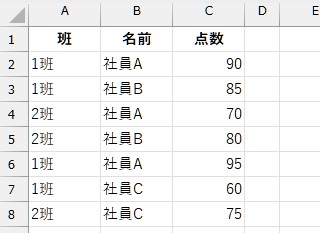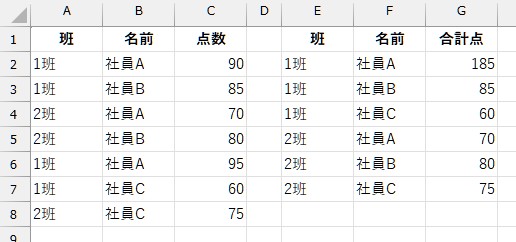2つの条件で集計する
セル直接版
VB
Sub SumScoresByGroupAndName()
Dim ws As Worksheet
Set ws = ThisWorkbook.Worksheets("Sheet3")
Dim dictAll As Object ' 班ごとのDictionary
Dim dictGrp As Object ' 班内の「名前→合計点」Dictionary
Set dictAll = CreateObject("Scripting.Dictionary")
dictAll.CompareMode = vbTextCompare ' 班名の大小区別なし
Dim lastRow As Long
With ws
lastRow = .Cells(.Rows.Count, 1).End(xlUp).Row
.Range("E:G").ClearContents
.Range("E1").Value = "班"
.Range("F1").Value = "名前"
.Range("G1").Value = "合計点"
End With
Dim i As Long
Dim groupKey As String, nameKey As String
Dim score As Double
' --- ネストDictionaryを使った集計(SUMIFS相当) ---
For i = 2 To lastRow
groupKey = Trim(ws.Cells(i, 1).Value) ' 班
nameKey = Trim(ws.Cells(i, 2).Value) ' 名前
score = Val(ws.Cells(i, 3).Value) ' 点数
If Len(groupKey) > 0 And Len(nameKey) > 0 Then
' 班のDictionaryが無ければ作成
If Not dictAll.Exists(groupKey) Then
Set dictGrp = CreateObject("Scripting.Dictionary")
dictGrp.CompareMode = vbTextCompare ' 名前も大小区別なし
dictAll.Add groupKey, dictGrp
Else
Set dictGrp = dictAll(groupKey)
End If
' 班内の「名前ごとの合計」
If dictGrp.Exists(nameKey) Then
dictGrp(nameKey) = dictGrp(nameKey) + score
Else
dictGrp.Add nameKey, score
End If
End If
Next i
' --- 結果を E列:班 / F列:名前 / G列:合計点 に出力 ---
Dim gKey As Variant, nKey As Variant
Dim outRow As Long: outRow = 2
With ws
For Each gKey In dictAll.Keys
Set dictGrp = dictAll(gKey)
For Each nKey In dictGrp.Keys
.Cells(outRow, 5).Value = gKey
.Cells(outRow, 6).Value = nKey
.Cells(outRow, 7).Value = dictGrp(nKey)
outRow = outRow + 1
Next nKey
Next gKey
End With
MsgBox "グループ×名前ごとの集計完了!", vbInformation
End Sub

→

配列+ネストDictionary版
Sub SumScoresByGroupAndName_Array()
Dim ws As Worksheet
Set ws = ThisWorkbook.Worksheets("Sheet3")
Dim dictAll As Object, dictGrp As Object
Set dictAll = CreateObject("Scripting.Dictionary")
dictAll.CompareMode = vbTextCompare '班名 大小区別なし
Dim lastRow As Long
With ws
lastRow = .Cells(.Rows.Count, "A").End(xlUp).Row
' D:E(F:G)結果クリアと見出し
.Range("E:G").ClearContents
.Range("E1").Value = "班"
.Range("F1").Value = "名前"
.Range("G1").Value = "合計点"
If lastRow < 2 Then
MsgBox "データがありません。", vbExclamation
Exit Sub
End If
End With
' ▼A2:C最終行を2次元配列で取得(1始まり)
Dim data As Variant
data = ws.Range("A2:C" & lastRow).Value
Dim i As Long
Dim groupKey As String, nameKey As String
Dim score As Double
' --- 集計(SUMIFS相当) ---
For i = 1 To UBound(data, 1)
groupKey = Trim(data(i, 1))
nameKey = Trim(data(i, 2))
score = Val(data(i, 3))
If Len(groupKey) > 0 And Len(nameKey) > 0 Then
' 班Dictionary取得(無ければ作る)
If Not dictAll.Exists(groupKey) Then
Set dictGrp = CreateObject("Scripting.Dictionary")
dictGrp.CompareMode = vbTextCompare '名前の大小無視
dictAll.Add groupKey, dictGrp
Else
Set dictGrp = dictAll(groupKey)
End If
' 名前別集計
If dictGrp.Exists(nameKey) Then
dictGrp(nameKey) = dictGrp(nameKey) + score
Else
dictGrp.Add nameKey, score
End If
End If
Next i
' --- 結果を配列にまとめて一括出力 ---
Dim gKey As Variant, nKey As Variant
Dim r As Long
r = 1
Dim result As Variant
ReDim result(1 To dictAll.Count * 10, 1 To 3) '※最大見積(後で詰める)
For Each gKey In dictAll.Keys
Set dictGrp = dictAll(gKey)
For Each nKey In dictGrp.Keys
result(r, 1) = gKey
result(r, 2) = nKey
result(r, 3) = dictGrp(nKey)
r = r + 1
Next nKey
Next gKey
' 実データ行数にフィットさせて出力
ws.Range("E2").Resize(r - 1, 3).Value = result
MsgBox "班×名前の合計点集計が完了しました!", vbInformation
End Sub
※ 結果は上記と同じ
SUMIFS vs Dictionary集計(高速版)
| 観点 | SUMIFS | Dictionary+配列(高速版) |
|---|---|---|
| 処理速度 | 遅い(毎回全行検索) | 高速(1回走査で完了) |
| 重複整理 | 別処理必要(UNIQUE等) | 自動でマージ(1行/1キー管理) |
| 出力形式 | 単一セル結果 | 一覧表が自動生成 |
| データ規模耐性 | 数万行で遅延 | 数十万行でも対応可 |
| 前処理(空白・整形) | 関数に依存 | TrimやValで制御可能 |
| 大文字小文字 | 区別なし | CompareModeで選べる |
| 拡張性 | 単純な合計処理 | 複数条件対応(SUMIFS相当) |
| メンテ性 | 式の維持が必要 | VBAでロジック管理 |
| 学習難易度 | とても簡単 | 少し高い(構造理解が必要) |
- Excelだけで済むならSUMIFS
- 大量データ/一覧化/高速化が必要ならDictionary+配列が最適解!
Dictionary版が強い理由(技術的)
- 1回の配列走査で集計完了
- ハッシュ検索で重複判定が高速
- 配列→Rangeへ一括書き戻しでシート操作を最小化
- キー管理によりデータ構造が整理される


コメント